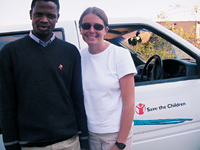| |
 |
| |
Kellogg
Corps participants bring their management and leadership
skills to international nonprofit organizations, including
a 2002 stint in Swaziland, Africa, with Save the Children. |
| |
|
Kellogg
Corps: leading by serving
"Doing
well by doing good” is a philosophy embraced by Kellogg
School students in a variety of the charitable work they do,
including their efforts as part of Kellogg Corps, a program
that creates opportunities for recent Kellogg graduates to
volunteer their time and leadership expertise by helping nonprofit
organizations in developing countries.
Now in
its eighth year, Kellogg Corps is unique among MBA programs
worldwide, and has made a real impact utilizing the skills
of Kellogg grads in areas as diverse as eco-tourism, market
research, MBA curriculum development and microfinance. Since
being founded in 1996 by three Kellogg School alumni, the
program has sent more than 250 participants to 33 nonprofits
in some 30 countries. The program has worked with organizations
that include Africare, Save the Children, World Vision and
the World Wildlife Fund.
James
O’Connor ’96, Kellogg Corps co-founder (along
with Sam Bottum ’96), was invited to join its advisory
board during the past year. “Kellogg Corps is sort of
like the Peace Corps for MBAs,” says O’Connor.
“We bring management and consulting skills to areas
of the world where they benefit people who would not otherwise
have access to such resources.”
This
year, student organizers strengthened Kellogg Corps’
resources by increasing the number of co-chairs to 10. These
people coordinate project development, fund raising, marketing,
finance and strategy. In addition to attracting more than
three dozen volunteers every year, organizing Kellogg Corps
itself serves as a real-world training ground for students
to master the challenges of leading a nonprofit organization.
“The
planning, attention to detail, and thoughtful communication
required to build relationships with funders and advisers
have taught me more about running a nonprofit than I would
have gotten in a classroom setting alone,” says Neel
Shah ’03, fund-raising co-chair for Kellogg Corps.
This year
has been particularly challenging for the organization, given
heightened security concerns about sending students to work
abroad, not to mention the difficulty of finding financial
sponsors during an economic recession. However, the needs
of nongovernmental organizations in the developing world are
more pressing than ever, which has kept the project development
co-chairs busy. Every year the co-chairs organize a rigorous
application process for prospective host organizations, during
which they must specify how they would leverage the skills
of four or five Kellogg MBAs during a four-to-six-week period.
“Finding
worthwhile projects requires months of planning and careful
selection,” notes Andy Brown ’03, a former Peace
Corps volunteer. At the end of that process, the co-chairs
are still confronted with making “very difficult choices
among host organizations that are all very deserving,”
according to Lisa Hsueh ’03, a former Food for the Hungry
volunteer.
Like
many student-led activities, an ongoing challenge for the
group has been fund raising. As trips abroad often cost as
much as $2,000 per volunteer — participants are expected
to contribute up to half this cost — one Kellogg Corps
activity has involved identifying new revenue sources.
“In the beginning, we looked to recruiters for funding
and even tried to trade airline miles for dollars,”
recalls O’Connor.
More recently,
Kellogg Corps has relied on sources as diverse as private
foundations, corporations, and other student-run Kellogg clubs.
Today, as a managing director for Motorola Ventures, O’Connor
helps identify multinationals with activities in developing
economies who might support Kellogg Corps with corporate grants.
Students are also working with Kellogg Professor David Messick,
co-director of the Kellogg
Ford Center for Global Citizenship, to obtain funding
for projects related to the natural and social environment.
“There
is no question that fund raising is among our crucial objectives
this year,” says Kurt Kempkes ’03, fund-raising
co-chair. “This program offers a rich experience for
the volunteer, the host organization, and for Kellogg to show
what MBAs can do to effect change in the developing world.”
Find out
more about leadership opportunities available through Kellogg
Corps at their Web
site.
|



